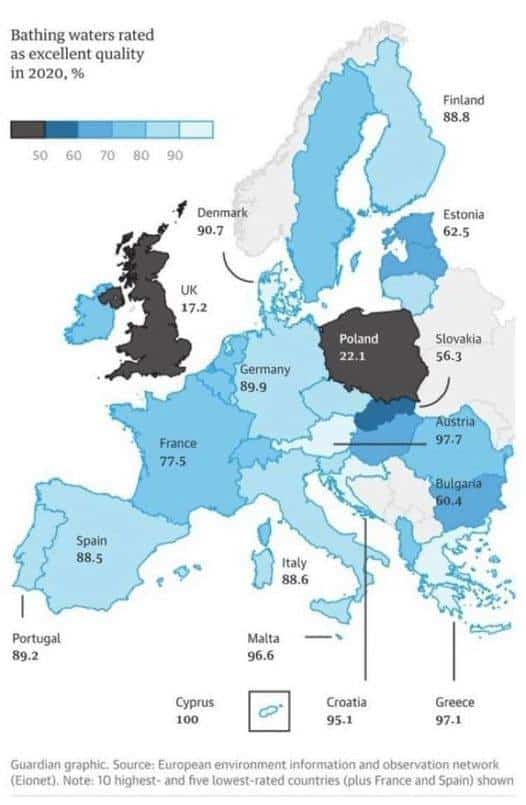Once again, swimmers in the UK have been disappointed as the latest bathing water quality data reveals a lack of clean and healthy waters for the summer. According to the European Environment Agency, only 110 coastal and inland sites in the UK were classified as excellent, out of a total of 640 sites. The majority of the UK’s bathing sites were not assessed in 2020 due to Covid-19 restrictions, leaving 457 sites without a verdict.
Out of the sites that were evaluated, twelve were found to be of poor quality, 29 were deemed sufficient, and 32 were classified as good. This lack of data pushed the UK to the bottom of the European league table, with only Poland having a lower percentage of excellent-rated sites at 22%. In contrast, countries like Cyprus, Greece, Malta, Croatia, and Austria excelled with 95% or more of their sites qualifying as excellent.
The 2020 data marks the last inclusion of the UK in the European Environment Agency’s rankings, as the country has chosen to opt out of EEA membership post-Brexit. This means that future comparisons with EU member states and non-members will not be possible.
The poor performance of the UK in bathing water quality has been a recurring issue, with the country consistently ranking near the bottom while other nations, including eastern European states, have shown significant improvements.
An investigation in 2019 revealed that water companies in the UK had discharged raw sewage into rivers on over 20,000 occasions and dumped tons of raw sewage on beaches. The situation has shown little improvement in 2023. These findings underscore the need for greater attention and action from authorities to address water pollution.
The European Environment Agency reported that 83% of coastal and inland sites across Europe were classified as excellent in 2020, similar to previous years. Only 1.3% of the tested sites, or 296 locations, were deemed to be of poor quality, a decrease from around 2% in 2013. Coastal sites generally fared better than inland sites, with 85% and 78% respectively achieving an excellent rating.
However, it is important to note that approximately 6% of the normally monitored sites in Europe could not be assessed due to Covid-19 restrictions. Additionally, countries often exclude many bathing sites that are commonly used, which could present a different and potentially risky situation if those places are not monitored.
Lidija Globevnik, a project leader for bathing water at the European Topics Centre, emphasised the need for increased attention from authorities, particularly towards unidentified bathing sites where people still swim. She also highlighted the impact of the climate crisis on bathing water quality, particularly for inland sites. Dry spells reduce water levels in rivers and lakes, leading to higher concentrations of pollutants from agricultural runoff and other sources. Globevnik stressed the importance of better management in agriculture, hydrology, and water extraction to mitigate these risks.
In response to the water quality issues, the European Commission has launched a review of the bathing water directive as part of its zero-pollution action plan. The current rules may be updated, and the public will have the opportunity to contribute suggestions for improvements through an online consultation.
Virginijus Sinkevičius, the European commissioner for the environment, fisheries, and oceans, expressed satisfaction with the high quality of bathing water in Europe, attributing it to the efforts made over the past four decades. He emphasised the importance of the zero pollution action plan in maintaining healthy and safe waters.
Although the Covid-19 pandemic did not directly affect water quality, it did result in the closure or limited access to many bathing sites due to social distancing requirements. Nevertheless, wild swimming gained popularity as an alternative for many individuals.
Hans Bruyninckx, the executive director of the European Environment Agency, commended the success of EU law in improving the overall quality of European bathing water and identifying areas that require specific action.
Join us in helping to bring reality and decency back by SUBSCRIBING to our Youtube channel: https://www.youtube.com/channel/UCQ1Ll1ylCg8U19AhNl-NoTg and SUPPORTING US where you can: Award Winning Independent Citizen Media Needs Your Help. PLEASE SUPPORT US FOR JUST £2 A MONTH https://dorseteye.com/donate/







